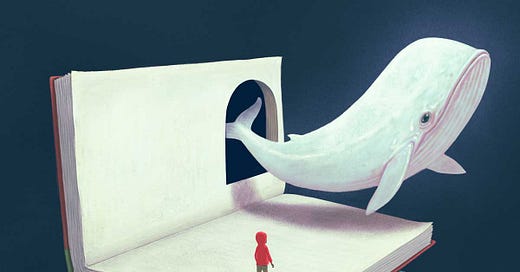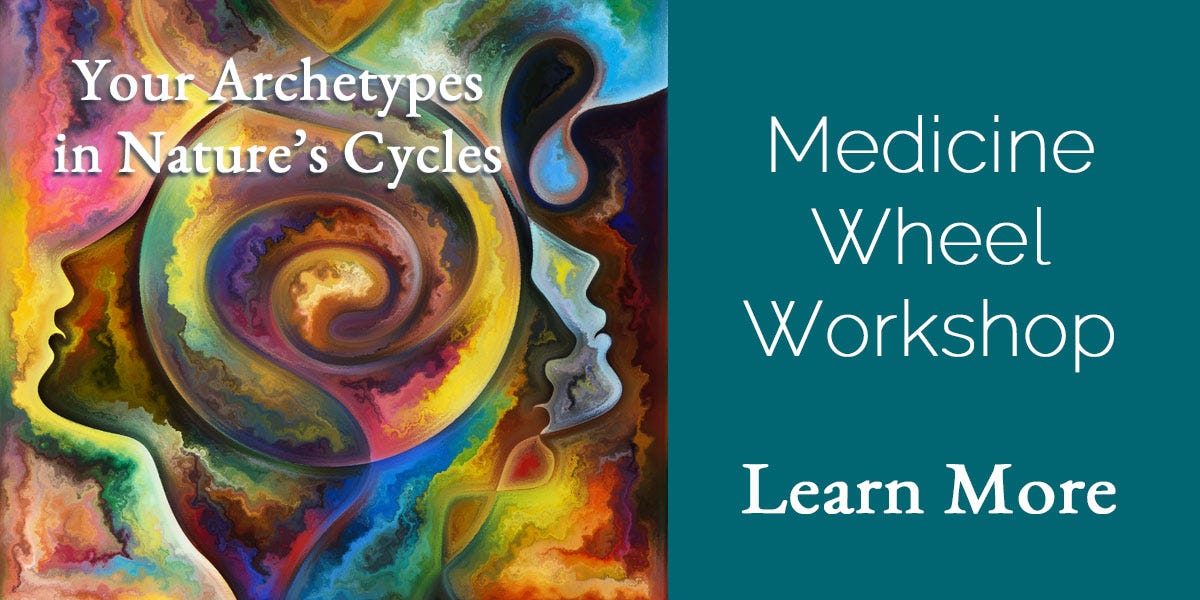Storyteller Archetype
When to tell and not to tell. Tall tales that reveal the truth. The light and shadow of the storyteller archetype.
Grab the LAST SPACE left in the Medicine Wheel: Your Archetypes in Nature’s Cycles which starts 3/6. Payment plans available. Reply to this email with questions.
New space available for individual Spiritual Direction and Conscious Business Mentoring clients. Sliding scale available. Contact Stacey by replying to this email.
Believing the Storyteller
Fact and fiction constantly tug at the storyteller archetype. Those without this archetype have no idea how complex this tension is. Which elements to include in the story and which to discard? If the storyteller were to tell the whole story, we’d be here all night and into the next 1001 nights.
Some bits, like the color of a person’s eyes are irrelevant to the facts of what unfolded, but critical to the mood of the story. The storyteller’s tone of voice changes the same set of words from a simple statement to an insult. The tale varies depending upon which perspective we take as the storyteller.
Stories can, by definition, be blatant lies. This is the storyteller in her shadow. Even worse is the storyteller believing her own fiction.
Stories can tell the truth. Fabricated stories reveal truths. Think of the wisdom at the heart of the world’s myths and folk and fairy tales. Historical novelist Elik Shafak says, "A story is a flue through which truth breathes" (from There are Rivers in the Sky).
Storytellers entertain through imaginary worlds. Good stories bring us to questions about the meaning of life. We explore facets of human nature through novels. Fiction connects us in ways no factual story can.
Blending the real and imaginary, the expert storyteller has us questioning reality. She expands our consciousness. There’s a reason all the enlightened ones and mystics resort to story.
Storytelling helps us work out the logistics of unbelievable things.
The “Tell”
There is the “story” and there is the “tell”. Put simply, telling is to give an account of events. In another way, the poker player looks for the “tell” on her opponent’s face. The storyteller archetype helps us discover the “tell” of what is really behind a story.
Stories carry deep messages in metaphor. The gifted storyteller knows the underlying message and purpose of her tale. We say she is “spinning a yarn” because there’s a thread to the story that matters.
The storyteller archetype must learn when to tell people how to feel about a story and when to tell the moral of the story. And, she must learn when to let the story speak for itself, not telling the audience what to think. Let the listeners feel into it for themselves.
This is hotly debated in the storytelling world. To tell or not to tell. Either extreme is the shadow of the storyteller archetype.
In her gifts, the storyteller helps the story grant wisdom. She gives insight into the listener’s life.
Great spiritual teachers - Attar, Rumi, Jesus, Buddha, Muhammad - teach in parables. The storyteller sets the imaginary and lived beside one another. Story helps us sort through the complexity of our situation. By not whittling the story down to a single moral, the storyteller allows the experience of the listener to lead her to her own answer.
Seeking the “Original” Version
In the ocean of the streams of story, the storyteller falls under the illusion that there is an original version. Tracing the tributaries to the main branch, she believes she must seek and be true to the original. Did it really come from Germany? Or was it’s real origin in Egypt, Mesopotamia or India? Was the girl’s name Prunella or Rapunzel?
The storyteller is right. Origins matter. Much is lost when the details of the distaff are taken out of context of the time and place they were first told. Stories tell us about our identity, literally forming nations. They connect us to our roots and to each other. Learning folk tales from our Motherland is infinitely healing.
The great epic of The Kalevala galvanized the Finish people under a shared language and identity. It was instrumental in Finland’s formation as an independent nation, breaking the hold of Russian rule.
Dortchen Wild told the Grimm brothers German folktales as an act of resistance. These young storytellers recorded stories to preserve German culture against the onslaught of Napoleon’s campaigns to assimilate the region into French culture.
Stories Slip Borders
This said, it’s also impossible to find a truly original story. For all stories have archetypal, universal roots.
"Fantastical tales are too promiscuous to stick with a single partner. They keep moving around, testing themselves in new locales, mixing with different story strands to create hybrid versions that free themselves from their predecessors, washing themselves clean of individual author's print marks.” - Nicholas Jubber
In her book Once Upon a Time, Marina Warner reminds us that stories “slip borders” and that there can be too much emphasis on the national spirit of story. She affirms that stories are living and constantly in flux.
The storyteller can have honest and virtuous concerns about staying true to the original. This good intention followed too strictly binds her into not telling any story at all.
On the other hand, the storyteller may be free of such self-consciousness. She might grasp the mandate to take a tale and refine it, wresting it free from patriarchy, racism and classism. This is a different quest for the original story. This is the story unfettered by the conditioning it was forced to tell.
The storyteller archetype in the light takes a story’s origins into account. She discerns when to pluck a story from a particular time and place, thus preserving the original. She intuits when and how to alter a story to convey a message for a modern audience.
She also discerns, like the great storyteller Angela Carter, when to take a story and turn it inside out, revealing stark new realities we must face.
Gifts of the Storyteller Archetype
The storyteller archetype has a gift for enrapturing an audience. She honors the structure of beginning, middle and end. Suspense, foreshadowing, climax, and resolution are the keys to her craft. The storyteller knows how to influence the story through her tone of voice, volume, cadence, and tempo. Her word choice and spotlighting are intentional. The ending she chooses is everything. She knows that it is not the specific characters or content that are important but what they stand for, what they tell us.
A gifted storyteller excels at reading archetypes. The storyteller is adept with symbolic language. She weaves the universality of human nature and experience throughout her tellings.
The skilled storyteller knows that the little girl in Thumbelisa is the eternal child. The storyteller highlights the archetypal struggles of the eternal child and what will resolve them. She knows why Thumbelisa sprouts wings. But, the storyteller won’t always just come out and say it…
In classic storyteller fashion, I could go on and on and on and on about this archetype. Alas, for now I will leave you with two great books. The first is a fascinating history of some of the world’s great storytellers. The second exemplifies what it means to rewrite the classics:
The Fairy Tellers: A Journey into the Secret History of Fairy Tales by Nicholas Jubber
The Bloody Chamber by Angela Carter
ONLY ONE SPACE LEFT!
8-Part Medicine Wheel Workshop
Your Archetypes in Nature’s Cycles
Thursdays starting March 6th at 4:30pm Mountain
Payment plans available! Reply to this email for details. Combine the wisdom of the medicine wheel with the insight of personality archetypes such as the storyteller in this small-group, online workshop with Spiritual Advisor and Archetype Analyst Stacey Couch. The medicine wheel is a universal map of the cycles of nature. It maps the seasons of our inner nature. The medicine wheel guides us through important life challenges and grounds us in the fabric all life. In this workshop with only five students, Stacey shares the qualities, stories, and associations with the cardinal directions that are universal to working with the medicine wheel. She guides students through the landscape of personality archetypes, helping you identify which are yours.
About the Author
Stacey Couch is a Spiritual Advisor who supports creative seekers learning as they go on the spiritual path. She serves beginner and life-long students of the soul. Her compassionate and collaborative approach honors the humanity and value of each person. Through meeting with Stacey, lost souls find refuge. Connection to the Divine is realized. Belonging comes. She is the author of Gracious Wild: A Shamanic Journey with Hawks. Learn about working with Stacey







